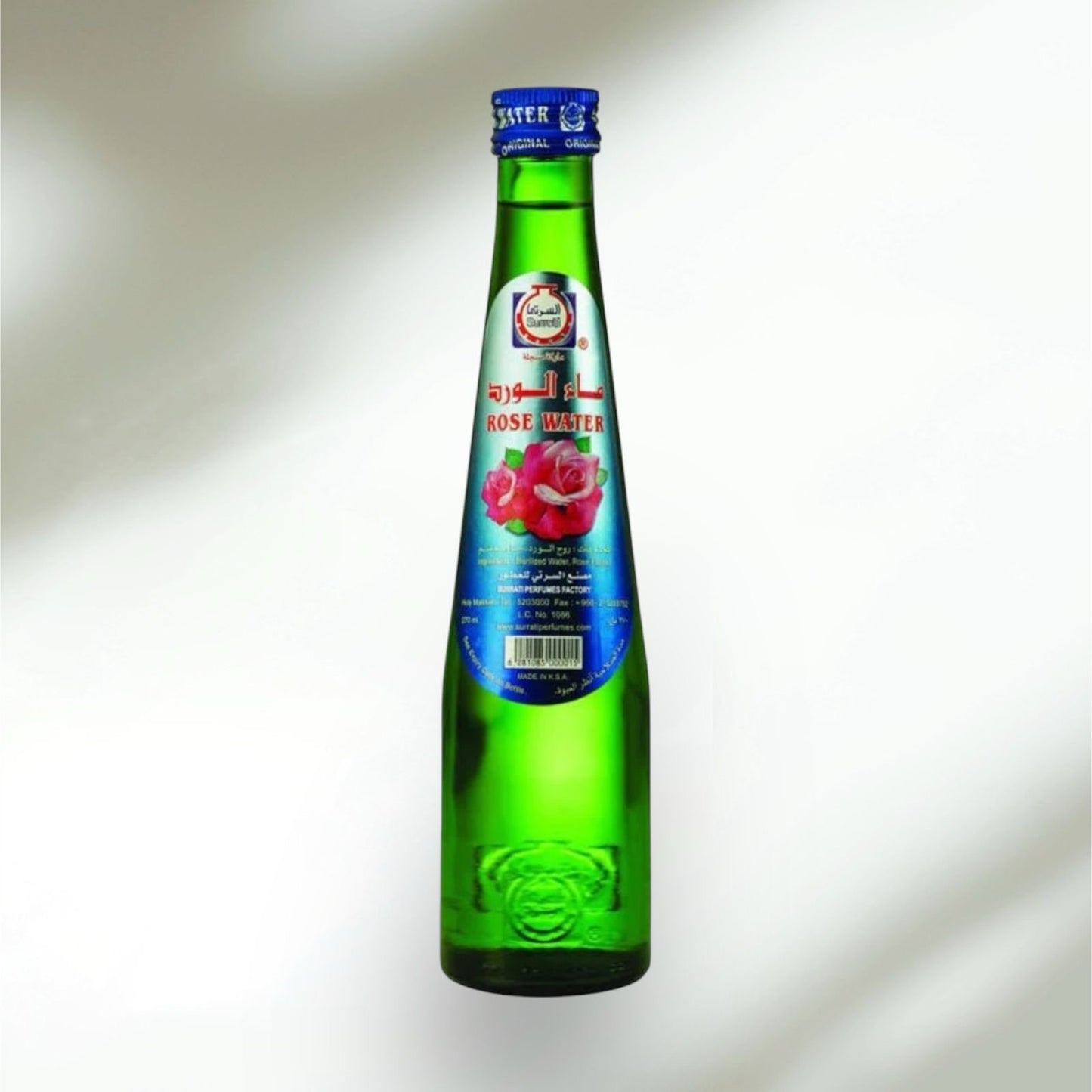Bish Organics
Premium Surrati Rose Water (For Beauty Toner & Excellent for Healthy Cooking)
Premium Surrati Rose Water (For Beauty Toner & Excellent for Healthy Cooking)
Couldn't load pickup availability

Collapsible content
Description
We have travelled the global south for you, to select the finest healing products. Powerful antioxidant and anti-inflammatory that helps protect the body from damaged caused by free radicals, which cause damage to cells and natural defences.
Surrati Rose Water since 1929
270 ML
Surrati Rose water is used in the tradition of maintaining the purity of the Kaaba, the most sacred mosque in Islam.
Surrati Perfumes offers a rose water that is part of the centuries-old tradition of keeping the Kaaba pure and sacred.
Infused with a delicate floral fragrance, this sacred rose water is part of the centuries-old tradition of maintaining the purity and sanctity of the Kaaba, the most revered site in Islam.
Rose water can bring benefits to all skin types, it can help sooth and cool sensitive and irritated skin, balance and cleanse oily skin, rejuvenate, soften and tone mature skin, revitalize and add beautiful glow to the normal skin. Rose water is filled with anti-oxidants and various vitamins, therefore, it can help prevent the signs of ageing and nourish the skin.
Rose water also has natural antiseptic, anti-inflammatory and anti-bacterial properties.
Ingredients: Sterilized Water, Blended Rose Flavour 0.2%, E1520
Surrati Rose water is a natural product extracted from rose flowers and is used for skin and hair care and sometimes in personal care.Rose Water is considered one of the magical natural products to take care of the skin and maintain its beautyWiping the face with cotton ball soaked in rose water makes the skin very clean
Drinking a little rose water on an empty stomach brightens the complextion and clears and the rose water shrinks pores and is good for acne prevention, it removes the swelling in the eyes by the compressess.
Rose water offers a range of potential benefits, from tension relief to smoothing skin. You can apply it topically to your skin, spray it around you, or ingest it.
Rose water is created by distilling rose petals with steam. Rose water is fragrant, and it’s sometimes used as a mild natural fragrance as an alternative to chemical-filled perfumes.
While there haven’t been many studies on the extent of its benefits, it contains compounds that may give it health-supporting effects, such as:
antioxidant
antiinflammatory
anticancer
antimicrobial
People have traditionally used rose water in beauty products and in food and drink since the Middle Ages. It’s potential health benefits may include:
LIST OF BENEFITS:
May soothe skin irritation, While some people use rose water to soothe irritation from eczema or rosacea
May reduce skin discoloration. The same anti-inflammatory properties can also reduce discoloration and puffiness.
People often use rose water as a natural toner to help improve their complexions.
Its mild antibacterial properties may also help reduce certain bacteria on the skin’s surface, reducing acne.
May have properties that support skin health as you age.
Research suggests that rose water has properties that helps reduce:
wrinkles
sun damage
oxidative stress, which can lead to skin damage
May help relieve cuts, scars, and burns. Due to its antiseptic and antibacterial properties, rose water may help wounds heal faster and reduce the risk of infection in cuts and burns.
May relieve mouth and throat soreness
May have antimicrobial properties that can reduce infections. rose water may be beneficial in managing symptoms of conjunctivitis, or pink eye, as well as other eye conditions that cause dryness and irritation.
Contains antioxidants that may help reduce oxidative stress. So consume it in savory or sweet dishes.
May be soothing in aromatherapy. Rose water and rose essential oil are commonly used in aromatherapy and may have anti-anxiety effects.
Forms and doses of rose water. You can apply it to the skin topically on its own, or mix it with moisturizers or natural oils like coconut oil.
You can also make tea from rosewater, rose petals, or rose hips or use it to flavor foods.
Rose is an edible flower, so you can also add petals to salads or desserts.
How to use rose water
You can purchase rose water, or you can make it yourself. You can use rose water as:
A facial cleanser or toner: After washing your face with your usual cleanser, rinse your face with rose water.
In recipes: You can add rose water to teas, such as hibiscus iced tea, or flavor other foods such as ice cream or yogurt.
As an aromatherapy mist: You can create a rose water mist by adding it to a spray bottle. This may help relieve stress. You can mist the rose water on your wrists, face, or even onto your pillow.
Once sold out we go to "ORE-ORDERS" So don't miss out on your Premium Surrati Rose Water and Buy Now

